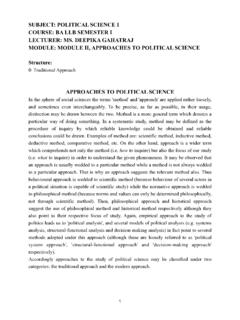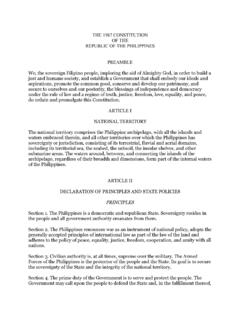Transcription of ATTITUDES AND VALUES FOR 2030 - OECD
1 ATTITUDES AND ATTITUDES AND VALUES FOR 2030 VALUES FOR 2030 OECD Future of Education and Skills 2030 Conceptual learning frameworkWell-being2030 ActionAnticipationRe ectionValuesAttitudesKnowledgeSkillsCore foundationsTransformativecompetenciesCre atingnewvalueTakingresponsibilityReconci lingtensions&dilemmasCo-agency with peers, teachers, parents, communitiesCompetenciesWell-being2030 Student agencyMore content at: this page foran interactive experienceApproaches to developing ATTITUDES and VALUES often draw on cultural and societal traditions while addressing global AND VALUES FOR 2030 ATTITUDES and VALUES are a key component of the OECD Learning Compass 2030, which helps students navigate towards well-being and the future we want. They refer to the principles and beliefs that influence one s choices, judgements, behaviours and actions on the path towards individual, societal and environmental and renewing trust in institutions and among communities hinges on developing core shared VALUES of citizenship (respect, fairness, personal and social responsibility, integrity and self-awareness) at school in order to build more inclusive, fair, and sustainable economies and , skills, ATTITUDES and VALUES are not competing concepts; they are developed interdependently.
2 As schools, workplaces and communities become more ethnically, culturally and linguistically diverse, it will be more important than ever to emphasise the inter-relatedness of knowledge, skills, ATTITUDES and POINTS ATTITUDES and VALUES are increasingly integrated into curriculum frameworks an acknowledgement that competencies require more than knowledge and skills. A diverse range of education systems are pursuing integrated approaches to developing VALUES and ATTITUDES , often drawing on cultural and societal traditions, while addressing global challenges. Recent trends in technology, notably the use of artificial intelligence, have put ethics high on the education agenda. Today s students will benefit from the capacity to evaluate the extent to which technology may or may not ensure a fair and equitable BRIEFFor the full concept note, click ectionValuesAttitudesKnowledgeSkillsCore foundationsTransformativecompetenciesCre atingnewvalueTakingresponsibilityReconci lingtensions&dilemmasCo-agency with peers, teachers, parents, communitiesCompetenciesWell-being2030 Student agencyOECD LEARNING COMPASS 2030 Socioemotional Learning, USA, Facebook and Yale Center for Emotional IntelligenceSource: ATTITUDES AND VALUES THROUGH SOCIO-EMOTIONAL LEARNINGV alues and Indigenous knowledge, Chile, Siemens StiftungSource: AND INDIGENOUS KNOWLEDGEV isit: DOWNLOAD the free SnapPress mobile app2.
3 SCAN this page with 3. DISCOVER interactive contentmobile app2 SCAN. DISCOVER 4 OECD Future of Education and Skills 2030 Concept Note OECD 2019 ATTITUDES and VALUES for 2030 The OECD Learning Compass 2030 defines ATTITUDES and VALUES as the principles and beliefs that influence one s choices, judgements, behaviours and actions on the path towards individual, societal and environmental well-being. VALUES are the guiding principles that underpin what people believe to be important when making decisions in all areas of private and public life. They determine what people will prioritise in making a judgement, and what they will strive for in seeking improvement (Haste, 2018[1]). ATTITUDES are underpinned by VALUES and beliefs and have an influence on behaviour (UNESCO IBE, 2013[2]).
4 It reflects a disposition to react to something or someone positively or negatively and ATTITUDES can vary according to specific contexts and situations (Haste, 2018[1]). The OECD Learning Compass 2030 was co-created by multiple stakeholders as a tool that is globally informed but locally contextualised. To acknowledge local differences, VALUES are classified into four categories: Personal VALUES are associated with who one is as a person, and how one wishes to define and lead a meaningful life and meet one s goals. Social VALUES relate to those principles and beliefs that influence the quality of interpersonal relationships. They include how one behaves towards others, and how one manages interactions, including conflict. Social VALUES also reflect cultural assumptions about social well-being, what makes a community and society work effectively.
5 Societal VALUES define the priorities of cultures and societies, the shared principles and guidelines that frame the social order and institutional life. These VALUES endure when they are enshrined in social and institutional structures, documents and democratic practice, and when they are endorsed through public opinion. Human VALUES have much in common with societal VALUES . However, they are defined as transcending nations and cultures; they apply to the well-being of humanity. These VALUES can be identified across spiritual texts and indigenous traditions spanning generations. They are often articulated in internationally agreed conventions, such as the Universal Declaration of Human Rights and the United Nations Sustainable Development Goals (SDGs). Different terminologies for ATTITUDES and VALUES are used in different contexts Depending on social and cultural contexts, different terms may be used instead of ATTITUDES and VALUES .
6 These terms include affective outcomes , aptitudes , attributes , beliefs , dispositions , ethics , morality , mindset , social and emotional skills , soft skills and virtues (or character qualities ). 5 OECD Future of Education and Skills 2030 Concept Note OECD 2019 Personal, social, societal and human ATTITUDES and VALUES can be incorporated into curricula using a variety of approaches and terms. While this concept note uses the term ATTITUDES and VALUES throughout, it does not exclude other terms. Indeed, clarifying these terms is essential for developing a common language and shared understanding. Haste (2018[1]) provides definitions for the following concepts1 related to ATTITUDES and VALUES : Affective outcomes refer to the emotional consequence of a person's experience of events, performance or judgement for example, anger, disgust, elation or regret.
7 Aptitudes refer to potential areas of capability, skill, talent, or a predisposition to learn or adapt easily in a particular domain. Attributes refer to characteristics of a person s beliefs, VALUES , skills or personality. Beliefs refer to both facts and strong convictions associated with VALUES . Factual beliefs are those based on (or claimed to be based on) evidence and data. Beliefs as strong convictions are based on core commitments to VALUES , through which factual data is filtered to create a convincing argument. Dispositions refer to a tendency to respond in particular ways to a situation due to pre-existing VALUES that affect judgement or action. Dispositions may reflect preferences based on aesthetics or what is enjoyed ( sport). They may also reflect general personality or mood states, such as a tendency towards optimism or pessimism, or qualities such as risk-avoidance or curiosity.
8 Ethics and morality are terms related to VALUES and behaviour associated with causing or preventing intentional harm to others, and to protecting and helping others. The terms are also used in conjunction with maintaining integrity with regard to one s VALUES , especially when these VALUES match the dominant VALUES of one s culture, such as trustworthiness, honesty, loyalty or fairness. Ethical and moral judgement derives from VALUES , but not all VALUES derive from ethics and morals. Mindset, a term popularised by Carol Dweck, means a disposition to frame experience, information or problems within a set of strategies based on VALUES or purposes. For example, a student with a growth mindset understands that his or her talents and abilities can be developed through effort. A mindset predetermines a person s responses to and interpretations of situations.
9 Depending on the type, mindsets can be productive and motivating, or rigid and resistant to change. Social and emotional skills refer to the abilities to interact and communicate with others; form and sustain relationships; manage conflicts; take others perspectives and empathise; manage one s own responses, especially affective responses, in social situations; and understand one s own emotional experiences in ways that enable affect to be positive and growth-oriented. Soft skills is a term often used as a generic category for social and emotional skills, but the term may also include managing motivation and applying VALUES . Virtues (or character qualities) are one way of looking at morality. A virtue is an enduring and consistent pattern of responses affective, cognitive and behavioural within a moral/ethical classification.
10 Virtues are seen as attributes of a person, like traits, and are formed over time as habits of response. Character is a constellation of virtues. 6 OECD Future of Education and Skills 2030 Concept Note OECD 2019 International bodies have identified ATTITUDES and VALUES as integral to individual and social well-being The importance of developing ATTITUDES and VALUES through education is increasingly discussed in international forums. The OECD is committed to helping countries strengthen and renew trust in institutions and among communities. This will require stronger efforts to develop shared VALUES of citizenship (respect, fairness, personal and social responsibility, integrity and self-awareness) at the school level in order to build more inclusive, fair and sustainable economies and societies.


















